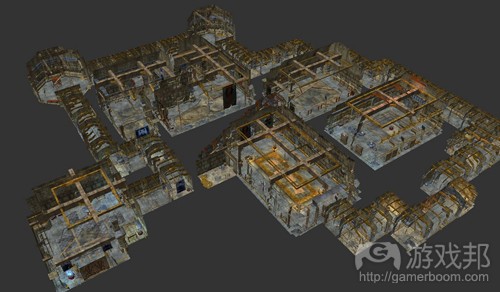开发者分享地下城关卡设计经验
我在过去9个月中一直在秘密开发自己的地下城游戏,并总结出了一些很好的经验。我认为这些经验能够帮助我制作出更好的游戏,在此我将与各位分享这些经验:
*地下城应该有个地方无法正常采光。例如,天花板不断往下滴水,浇灭玩家手中的火把,或者吹来一阵风令火熄灭,甚至是缺氧的地区或灌满水的地道。
*至少每2-3个关卡中都有一个道具/特效拥有一些持久而实际的作用。
*增加一些平台、俯瞰视角以及高峰,从而为设计创造立体效果。这可以为玩家提供训练其灵敏性的机会。
*在设计第一个地下城时不要追求尽善尽美。在你经过多次练习,积累足够的想法和经验时,就可以创造出更精巧的地图了。
*不要让你的地下城中随机、非常规或奇怪之处显得模糊不清。要清楚呈现其中的不寻常之处。
*多数时候要提供丰富的内容,但这些内容并一定需要是绝妙创意。
*要让你的地下城看起来饱经沧桑。设置一些明显被修复/扩建或者曾经崩塌的痕迹。这可以打破关卡的单调,并为交战提供掩护之处。
*如果这是你第1次设计地下城,甚至是第20次,也不要惧怕借鉴自己喜欢的旧式地下城的功能。
*暗处的威胁与明处的威胁同样有效。可以适当创造一些虚假的通道和不祥的走道,以令玩家行动之前三思。
*玩家在地下城发现的道具并不是永久性的。要找到道具的流通方法——要不就放弃道具以便赢得时间,要不就将其贡献给神灵从而换得一件不同/更好的道具。
*小型目标和支线任务也是设计的必要元素。要让地下城外的玩家知道地下城内发生了什么情况。
*可以让地下城的怪物适时撤退——并一定需要与玩家决一死战。
*不妨设置一些会把玩家抓去当俘虏的敌人种族,而不全是将其杀戮的怪物。
*并非一切物品都要让玩家费血掏金。可以设置一些以信誉、时间、责任为成本的资源。
*可发设置许多不同的问题——例如无法在玩家群体中平均分配的钱币和道具。让这些决定成为他们闯关时的经历之一。
*但也要现实一点,因为对某些群体来说,这种设计很有意思,但对其他人来说就很多余了。所以首先要了解目标用户。
*要克制住设计过多内容的欲望。要知道关卡中还有许多玩家无法探索的东西(游戏邦注:例如岩石)。
*重用旧空间。要以让那些位于更顶端关卡的道具、物品和地点与低级关卡中的内容相互关联。
*要让玩家知道自己并非首次进入的人——可以在地下城中随处散落一些无名尸体及其掉落的财宝。
*不一定要让入口居于最边缘的位置,有时候也可以设计在关卡中间。
*地下城中不一定要有超级怪物。玩家所遭遇的额外困难应该来自障碍物,以及地下城所自然呈现的关系。
*可以让其他怪物加入战斗或者逃走报信。
*要以逻辑方式思考。许多地下城有一个常规的开放区域,其中会将“工作”区或“居住”区设为非战斗区域。
*阀值对神话和RPG来说很重要。要有一些解琐下一个区域/关卡的困难挑战。
*要清楚细节会随着时间改变。
*要理解你的某些神秘感和情节不会追随玩家的步伐。这没有关系,只要有结果就行。
*多样化很关键:不要在每个房间都设为势均力敌的战斗场景。要让其中某一方战斗力失衡。这会促进玩家发挥潜能,并且要在之后对其进行奖励!
*摧毁你的地下城,例如大爆炸、陷阱、塌方、战争、实验等,在游戏过程中至少要改变地下城地理环境一次。
*你的地下城会如果看起来像是自然设计,或者由智能物种因特定目的而设计,而不仅仅是为游戏而设计,那就会更有沉浸感。
原文发表于2013年3月29日,所涉事件及数据以当时为准。(本文为游戏邦/gamerboom.com编译,拒绝任何不保留版权的转载,如需转载请联系:游戏邦)
How Do I Design a Dungeon?
Heya,
I hadn’t planned on posting this article for quite a while, but it turns out that two days ago Alex Shroeder just started this year’s One Page Dungeon Contest. If you want to take a look at some
past winners, click here. I’ve been secretly working on my own dungeon game for the last nine months, and have accumulated a lot of good advice. Not all of it is applicable to the one page
dungeon contest, but I feel it has helped me in my quest to make a better game. I will share that advice with you here:
Dungeons ought to have an area where lack of light is an issue. For example, dripping ceilings that get torches wet or wind that blows them out or even low oxygen areas or flooded tunnels.
At least 1 item/effect per 2-3 levels should have some kind of lasting and tangible effect on at least one PC.
Add ledges, overlooks, and peaks to create three dimensions in your design. This will also give your players a chance to exercise their cleverness to get around.
Don’t aim for the stars on your first dungeon design. You will build up ideas and the ability to create more elaborate maps as you go thru the process several times.
Don’t get too caught up in making your dungeon subtly random, irregular, or odd. Be obvious with what’s unusual.
Food and drink should be fairly abundant for the most part, but it doesn’t have to be delicious. Mmmm…Rats!
Make your dungeon used. Have sections where there is some obvious repair/expansion work being done or evidence of a collapse. This will break up the monotony and provide cover during fights.
If this is your 1st time, or even your 20th, there’s nothing wrong w/looking at old dungeons you love & copying features.
Implied threats are as effective at real threats at times. Create false leads and ominous doorways that make PCs think twice.
Items found in dungeons are not meant to be permanent. Find ways to keep a circulation of items going- whether that’s sacrificing them to earn favor with a subterranean race or to an idol to
get a better/different item in return.
Mini-goals and side quests are necessary for design. Keep the people outside the dungeon important to what’s happening inside the dungeon.
Monsters can and should retreat- not everything should be a pitched battle to the death.
Most of the sentient races are far more interested in having a slave than killing adventurers.
Not everything should cost blood or gold. Things can cost honor, time, obligations, and other resources.
Propose lots of different problems- including coins and items that can’t be easily divided among the group. Making these decisions is part of the dungeon-delving experience.
Realism: for some groups this really matters, for others it’s superfluous. Know your audience.
Resist the temptation to maximize the use of your graph paper. There should be plenty of it that can’t be explored (i.e. solid rock).
Re-use old space. Make items, objects, and locations that are in the upper levels relevant to what’s in the lower levels.
Show the players they aren’t the first ones there- have bodies/treasure of other dead heroes placed in your dungeon in various places.
The entrance does not always have to be at the edge of the paper. Start in the middle sometimes.
There should be no need to hyper-charge the monsters in your dungeon. The additional difficulty of your encounters should come from the hazards & relationships innately present in the dungeon.
Think about what other monsters might join a fight or run to sound an alarm.
Think logically. Many dungeons will have a common, public area with “work” areas or “living” areas as off-shoots.
Thresholds are important in mythology and in RPGs. There should be hard challenges that unlock the next area/level.
Understand that details will change over time. Don’t be afraid to retcon something to improve the campaign if everyone can agree to it.
Understand that some of your mysteries and plots won’t be followed by the players. That’s okay, proceed with consequences.
Variety is critical: don’t put 1 monster per PC in every room. Make most encounters lopsided for one side or the other. This will stretch your players- and reward them!
Wreck your own dungeon: have explosions, traps, cave-ins, wars, experiments, etc. permanently alter the geography of the dungeon during play at least once.
Your dungeon will feel more immersive it if looks like it was designed by nature or for a specific purpose by an intelligent being and not designed just for a game.(source:socratesrpg)
上一篇:工作室该如何争取更多优秀的人才








































 闽公网安备35020302001549号
闽公网安备35020302001549号